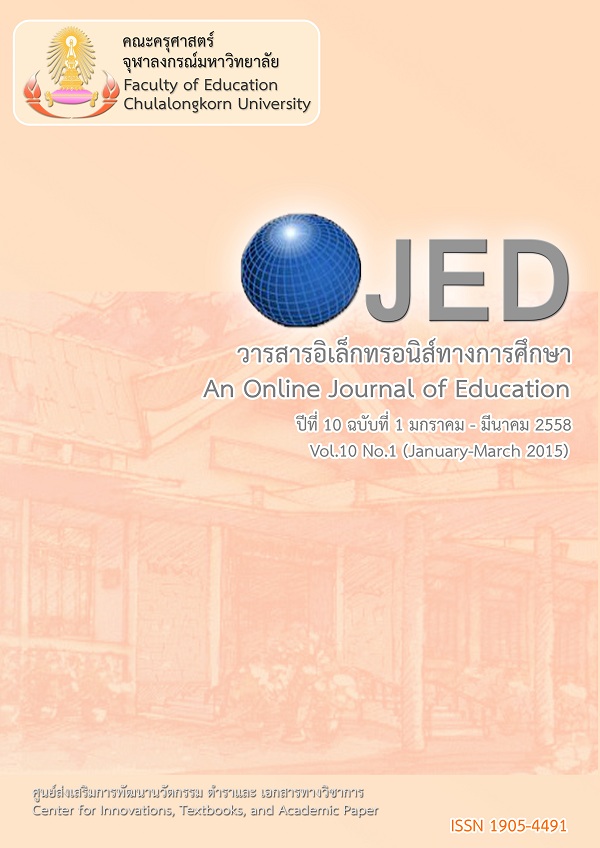การพัฒนาโปรแกรมเปลี่ยนแปลงพฤติกรรมการบริโภคอาหารและการออกกำลังกายโดยใช้ทฤษฎีขั้นตอนการเปลี่ยนแปลงพฤติกรรมสำหรับนักเรียนมัธยมศึกษาตอนต้นที่มีภาวะน้ำหนักเกิน
Keywords:
พฤติกรรมการรับประทานอาหารและการออกกำลังกาย/ ภาวะน้ำหนักเกิน/ ทฤษฎีขั้นตอนการเปลี่ยนแปลงพฤติกรรม/ FOOD CONSUMPTION AND EXCERCISE BEHAVIORS/ OVERWEIGHT STUDENT/ TRANSTHEORETICAL MODELAbstract
การวิจัยกึ่งทดลองครั้งนี้มีวัตถุประสงค์เพื่อศึกษาประสิทธิผลของโปรแกรมเปลี่ยนแปลงพฤติกรรมการรับประทานอาหารและการออกกำลังกายโดยใช้ทฤษฎีขั้นตอนการเปลี่ยนแปลงในนักเรียนระดับชั้นมัธยมศึกษาตอนต้น ที่มีภาวะน้ำหนักเกิน โรงเรียนราชวินิตมัธยม กรุงเทพฯ ทำการสุ่มกลุ่มตัวอย่างจำนวน 40 คน โดยแบ่งเป็นกลุ่มทดลอง (20 คน) และกลุ่มควบคุม (20 คน) เกณฑ์การคัดนักเรียนเข้าร่วมการวิจัย ได้แก่ นักเรียนที่มีค่าน้ำหนักตามเกณฑ์ส่วนสูงแสดงความอ้วนผอมกลุ่ม +2 SD ไม่เกิน +3 SD กลุ่มทดลองได้รับโปรแกรมประกอบด้วย การให้ความรู้ และการออกกำลังกาย การเก็บรวบรวมข้อมูลใช้แบบวัดพฤติกรรม แบบวัดผลสัมฤทธิ์ทางการเรียน และชั่งน้ำหนักตัว หลังการทดลองสัปดาห์ที่ 8 วิเคราะห์ข้อมูลด้วยสถิติเชิงพรรณา โดยทดสอบค่าที (independent samples t-test) ระหว่างกลุ่มทดลองกับกลุ่มควบคุม และค่าที (Paired t-test) ภายในกลุ่มทดลอง ที่ระดับนัยสำคัญทางสถิติ .05 ผลการวิจัยพบว่า กลุ่มทดลองมีคะแนนเฉลี่ยพฤติกรรมการรับประทานอาหารและการออกกำลังกาย และผลสัมฤทธิ์ทางการเรียน สูงกว่าก่อนการทดลองและกลุ่มควบคุม และน้ำหนักตัวลดลง อย่างมีนัยสำคัญทางสถิติ (p-value < 0.05) ข้อเสนอแนะจากผลการวิจัย คือ ก่อนการจัดโปรแกรมให้นักเรียนควรมีการประเมินความพร้อมในการเปลี่ยนแปลงพฤติกรรมและโปรแกรมที่จัดให้ควรเหมาะกับขั้นตอนที่ประเมินได้ในขณะนั้นด้วย
The purpose of this quasi-experimental research was to investigate the effectiveness of food consumption and exercise behaviors by applying the Transtheoretical Model for overweight secondary school students in Rachavinich Matthayom School, Bangkok. A total of 40 subjects were randomly selected and assigned to be an experimental group (n=20) and a comparison group (n=20). Inclusion criteria included those overweight classified by height by weight between +2SD to +3SD. The experimental group was treated by the intervention which consisted of acknowledgement, and physical activity. Data were collected by using behavior assessment questionnaires, learning achievement assessment forms, and weighing balance before and 8 weeks after the intervention. Statistical analysis employed descriptive statistics, independent samples t-test and paired t- test. The results revealed that the experimental group showed higher mean scores of exercise behaviors, good food consumption behaviors, and learning achievement after the intervention than those of the comparison group (p-value<.05). In addition, mean eight of the experimental group significantly decreased after the intervention (p-value<.05). The results suggest that there should be an assessment of readiness for changing behaviors before applying the program. The program should be appropriate for a particular stage of change evaluated as well.




